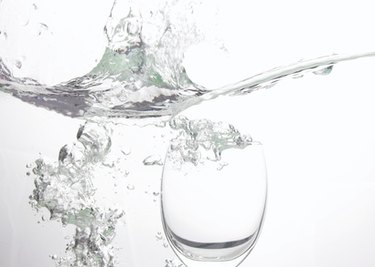
An adult body is composed of at least 70 percent water, which indicates waters' importance for health and proper function. Drinking plenty of water, often considered to be between eight and 10 8-oz. glasses per day, provides many benefits, including preventing and relieving tight and cramped muscles related to dehydration. However, tight muscles can have a variety of causes and might require dietary and lifestyle changes to adequately deal with.
Normal Muscle Tone
Video of the Day
Skeletal muscle is comosed of long muscle fibers made of protein. The primary purpose of muscle is to move bones via their attachments called tendons. Muscles are positioned in opposing fashion, meaning that for one muscle to contract another one must relax and stretch a little. Minerals, electrolytes and water are all needed for normal muscle tone and function. Calcium is especially important for contraction, magnesium for relaxation, and water for firmness and electrolyte exchange. Tight muscle has many causes, including dehydration.
Video of the Day
Dehydration
Most Americans appear to drink adequate amounts of liquid, but it is often in the form of coffee, tea, soda pop, energy and sport drinks, beer and wine. These beverages are largely water of course, but they contain caffeine or alcohol, which are considered diuretics. Diuretics alter the electrolyte and water exchange in kidneys such that less water is absorbed and more is secreted as urine. Chronic use of diuretics leads to dehydration, which is defined as at least 5 percent reduction of the body fluid, according to "Fluids and Electrolytes with Clinical Application." Moderate dehydration is up to a 10 percent loss of water, whereas a 10 percent to 15 percent loss is considered severe and a medical emergency. Muscle tightness or cramping in the large muscles of the leg is an early sign of dehydration, which can be prevented or combated by reducing diuretic intake and drinking plenty of pure water.
Other Causes of Muscle Tightness
Although mild dehydration is a relatively common cause of muscle tightness and cramping, especially in hot climates, muscle fatigue from stress or too much exercise is more common, according to "Biochemical, Physiological and Molecular Aspects of Human Nutrition." Athletes commonly have tight muscles, as do people who are under stress. Tightness from stress usually is experienced in the upper shoulders, neck and around the jaw. Chronically tight muscles lose their flexibility and might become painful to the touch. Mineral deficiency, especially magnesium, can lead to muscle tightness, twitching and maybe even restless leg syndrome at night. A lack of electrolytes, such as sodium, interferes with nerve conductance to muscle fibers and results in tightness and spasms. Poor blood circulation hampers the minerals, electrolytes and water getting to muscles, which can cause symptoms. Other conditions that can cause muscle tightness include pregnancy, diabetes, infections and poorly fitting shoes.
Suggestions
Reducing consumption of alcohol and caffeine while increasing water intake is a healthy strategy regardless of muscle tightness. If this strategy fails to prevent muscle tightness, then increasing your mineral and electrolyte intake is a logical next step. Eating bananas and salting your food with sea salt can be helpful. If you still are experiencing muscle tightness, then light exercise, stretching or massage might be of great help. If not, a consultation with a health care professional should be considered.